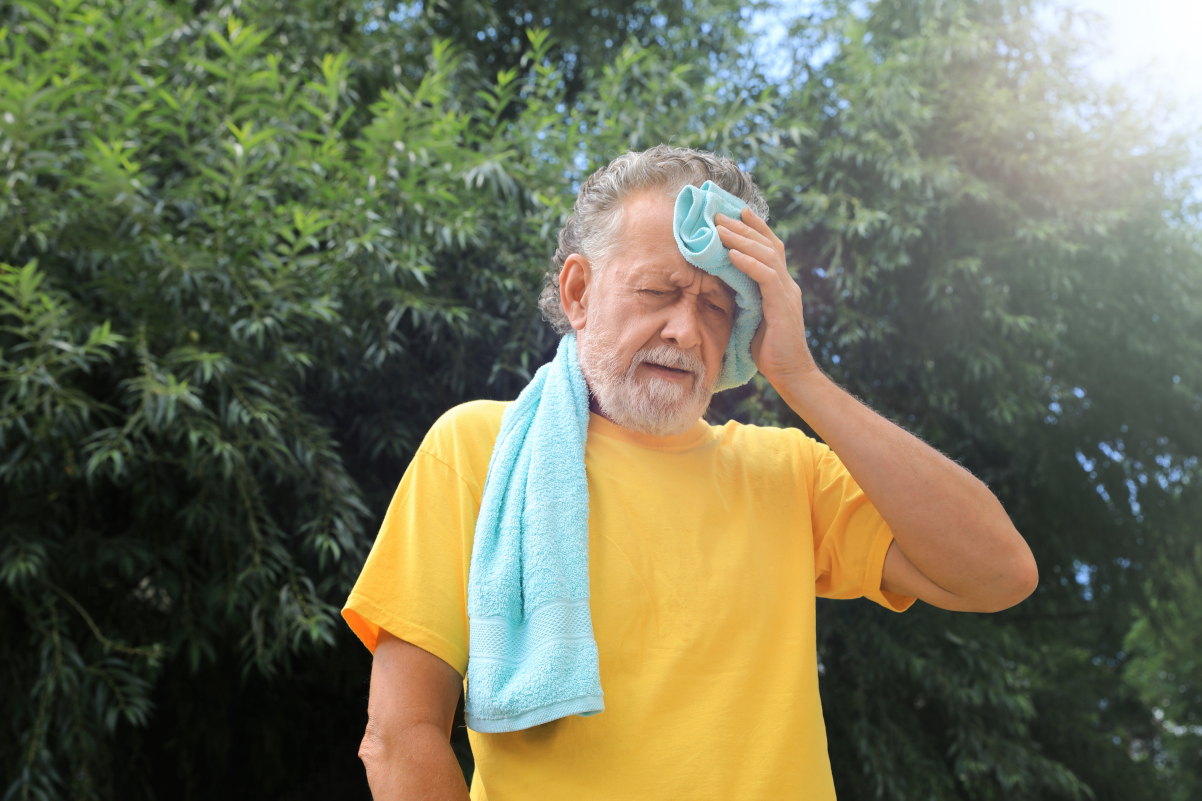Warm weather can be good for senior citizens. It makes going out easier because no extra layers are needed. However, sometimes the warm weather can be too much. High temperatures and intense sunlight can be a dangerous combination for elderly people.
Older adults have a higher risk of dehydration and heat stroke compared to younger people. They have a harder time adjusting to temperature changes. They are also more likely to have medical conditions or take medications that impact their body’s ability to control internal temperature or sweat.
Casas Senior Assisted Living knows how important hot weather safety is for older adults. Everyone should be mindful of their wellbeing when going out this summer. Seniors need to be especially careful and should understand the risks and how to minimize them.
What Should Seniors Wear in Hot Weather Conditions?
The clothing we wear will have a direct effect on our comfort. Senior citizens should wear light-colored garments with a looser fit. This will provide coverage but also allow heat to escape. Cotton clothing is a good choice.
Covering the skin can help prevent sunburn. It’s also beneficial to bring a wide-brim hat and sunglasses for further protection. Remember to wear adequate sunscreen on any skin that will be exposed to sunlight.
The right clothing can help prevent seniors from overheating, however, you should still have a plan in place in case it isn’t enough.
How Long Can Seniors Stay Out in the Sun?
The length of time a senior can safely stay out in the sun will vary based on weather conditions and health status. The hotter it is, the shorter the duration should be. Temperatures over 80 degrees Fahrenheit tend to be more dangerous.
Sunlight isn’t all bad. It helps the body produce vitamin D. Spending five to ten minutes in sunlight a few times a week can be good for your health. However, much longer spent in hot temperatures will increase the risk of medical concerns.
The exact amount of time that is safe for a senior to be outside on a hot day will vary based on their health, medications, and other factors. Pay close attention to how they feel and always err on the side of caution by keeping exposure brief when it is particularly hot outside. Make sure there is a cool, shaded spot to retreat to in case the heat becomes too intense.
The spring season may offer more hospitable temperatures for elderly people. You can check out these 7 safe outdoor spring activities for seniors for activity ideas.
How to Stay Hydrated While Spending Time Outdoors
Hydration is essential to good health. This is especially true for older adults who may have a diminished sense of thirst.
A good way to protect yourself or an aging loved one is to monitor fluid intake. Make sure everyone is drinking enough water, even if they don’t feel especially thirsty. More water will be needed after doing physical activity or while sitting outside in hot weather.
Water intake needs to occur throughout the day to keep the body going. To ensure that you have adequate hydration for everyone, you can:
- Bring a cooler with bottled water to place close by
- Fill travel mugs or gym water bottles and bring them with you
- Be aware of nearby water fountains or sinks when in public
- Pack a pre-filled mister or fan with a misting feature
Heat can affect someone when traveling in a vehicle. Water should be readily available from wherever the senior is, whether they are at a picnic, sitting in a car, or resting on the front porch.
Preparing to Travel with a Senior During the Warm Season
Summer is a popular time to take vacations and family trips. Any time you plan to travel with older people, you should prepare. That includes excursions that will span multiple days as well as shorter day trips. What can you do to ensure senior safety during hot weather?
- Keep beverages close by so they can be accessed with minimal effort while traveling
- Wear sunscreen to protect skin from sunlight coming in through car windows
- Know where rest stops are in case you need to pull over and take a break
- Have a plan to reduce time outdoors in case you face delays or vehicle trouble
- Pack a portable shelter if you will be traveling through rural areas without rest stops
- Make sure seniors have all necessary medications and medical aids with them
- Keep mobile phones charged and accessible in case you need to call for assistance
Seniors with health concerns should consult their doctors before traveling. A medical professional can make recommendations for safe travel and give advice to avoid an emergency.
How to Recognize the Signs of Dehydration in the Elderly
The signs of dehydration may not be obvious right away. They can start small but become a serious medical problem quickly. Make sure you know the signs of dehydration in elderly adults before you travel.
The most common symptoms of senior dehydration include:
- Urinating less than usual
- Constipation
- Dry mouth
- Dizziness or confusion
- Headache
- Nausea
- Muscle cramps
- Increased heart rate
- Drop in blood pressure
A person’s skin can also tell a lot about how hydrated they are. In a healthy person, pinched skin should return to its normal shape. In someone who is dehydrated, the skin may remain raised after being pinched.
Providing Aid for a Senior Who is Dehydrated
If you see any combination of the symptoms listed above, take action right away. Severe dehydration can lead to death if not treated immediately. You should contact emergency services if the individual is showing moderate or severe signs of dehydration.
If symptoms are not yet at an emergency level, you can:
- Move out of the sun and into a shaded place – ideally somewhere indoors to cool off
- Get the senior to drink water or sports drinks with electrolytes if they are available
- Eat foods with a high water content, like fruits and vegetables
Moderate to severe levels of dehydration should be treated by a doctor. If untreated, the patient may experience seizures, brain damage, or death. If you aren’t sure how severe the situation is, you should call a doctor for advice right away.
Safety is essential to good health for elderly people. You can also check out 10 changes senior citizens can make to lower their fall risk at home for more ways to protect a loved one.
The summer season should be fun for everyone, including seniors. Everyone should take steps to enjoy the warm weather safely this year.

